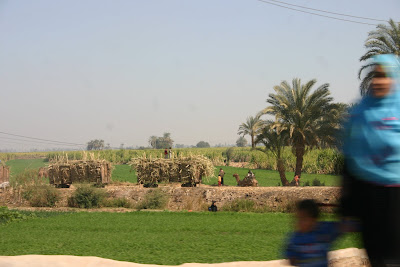not much when you consider the price of packet sugar in the shops in the eu. but they get quite a good income as for Egypt.
 .
.Net even moved from the bridge and the road has been closed for a tractor pulling t trailers of Sugar cane
 .
.and again another load some of the tractors will take the load direct to the factory some 26 kilometers to Qus but mainly the sugar is transported by rail . the rail system that is narrow guage will take the sugar to Qus or go in the opposite direction to Isna a place more well know for its Pharaonic Temple of Knum
http://myegypttours.blogspot.com/2009/07/isna-temple_6814.html
 .
.the first cut of sugar last December 09 is already growing again for next season,
Sugar cane here in Egypt has a four year growing cycle ie planted, when grown is cropped the dry cut grass from the cane tops is burnt in situate once the green leaves have been carted away these have many uses mainly for animal fodder. then the new crop grows again
 .
.Camels, donkeys even cattle are used to haul the sugar to the waiting train wagons
 .
.Here there is part of the field ready for burning. the width of this field is about the width a farmer will own
and can be as long as one kilometer. farmers help each other to cut and this is all done by hand using a 9" curved blade. this photo shows a donkey and cart being used to haul the cane.
 .
.here three lots of farmers are harvesting 3 fields each field harvested will be put on separate wagons because the wagon will be labeled then weighed on arrival at the factory.
 .
.Stopped for a cup of tea in one of the villages here load after load was heading for the factory.
harvesting is done between the months of late November to mid May.
 .
.Green grass heads on there way by donkey to the villagers homes
 '
'Each cane loading area has a siding that can hold 150 wagons each train that leaves will have from 60 to 150 (2 engines)wagons . trains leave everyday at 2.00 and 14.00 hours. so you can imagine how many kilos of cane is harvested each year. by road and rail even by barge on the Nile. and this is only from the Luxor area.

 '
'There is so many wagons on this one I could not get them in one frame'

 .
.Farmers homes are always near the Canal or the Nile

 '
'Ahmed my driver having a game of dominoes with some of the boys in the village'
 .
.


 '
'The Nile is at its lowest some people say its the lowest it has ever been and are starting to worry because the harvested fields now need inundating for next years crop. the farmers here near my home have not had any water for the fields for 3 weeks and crops are already starting to wither if this happens for much longer it will effect next years harvest.
usually the canals are always at a level 1 meter higher than this the gates are all open for when the water comes. from the canals the water is pumped up to the required level to inundate the fields

.
Another use for sugar cane grass .is to fire up the mud brick fire pyres. 20 thousand bricks can be baked in one pile.
 .
.Date palm tree cut to make a foot bridge would not like to fall in this. channel no5 comes to mind.
all of Egypt is like this, one big rubbish dump, Find a gap and fill it in at least the animals and wildlife have a good feed.
Finish off the sugar cane series with a couple of village photos
and another reason I love living in Egypt taking the good with the bad.



Arriving at our destination for this trip Garagus near Qus, yes" I have you all fooled. but to make it easier have given you a map of Egypt we are between the City of Luxor and the town of Quena in the upper delta of Egypt

.

No comments:
Post a Comment